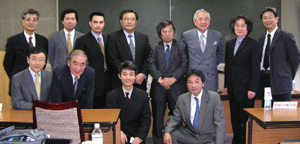Science Council of Japan Symposium, "Building Intellectual Bridges in Asia": Summary
Takahiro MIYAO (Professor, GLOCOM, and Head, Japanese Institute of Global Communications)
Symposium Summary
[Science Council of Japan: Law/Politics Section] |
| Symposium: "Building Intellectual Bridges in Asia" |
| Date/Time: | June 15 (Wednesday) 13:00-17:10 |
| Place: | Science Council of Japan: 7-22-34 Roppongi, Minato-ku, Tokyo |
| Program: |
1. Opening Remarks
Kiyoshi KUROKAWA (President, Science Council of Japan)
Michiatsu KAINO (Vice President, Science Council of Japan)
2. Keynote Speech
3. Presentations
"AsiaBarometer Database"
Timur DADABAEV (Associate Professor, University of Tokyo)
"Asian Legal Search System"
Yoshiaki KOBAYASHI (Professor, Keio University)
"On GLOCOM Platform"
Takahiro MIYAO (Professor, GLOCOM, IUJ)
"Legal Assistance in Asia"
Masanori AIKYO (Professor, Nagoya University)
"Information Exchange on Khmer Code"
Shiro HARADA (Associate Professor, University of Tokyo)
4. Panel Discussion
Panelists:
Kazuo OGURA (President, The Japan Foundation)
Hideaki SHIROYAMA (Associate Professor, University of Tokyo)
Satoru OSANAI (Professor, Chuo University)
Makoto IOKIBE (Professor, Kobe University)
Itaru SHIMAZU (Professor, Chiba University)
5. Concluding Remarks
Seigo HIROWATARI (Director of Law/Politics Section, Science Council of Japan)
|
| Sponsor: | Sponsor: Science Council of Japan
Co-sponsors: University of Tokyo, Keio University and Nagoya University |
University of Tokyo Professor Takashi Inoguchi organized a symposium, "Building Intellectual Bridges in Asia," sponsored by the Science Council of Japan, on June 15, 2004. The following is a summary of the symposium.
First, Professor Kiyoshi Kurokawa (President, Science Council of Japan) gave opening remarks and pointed out the importance of Asia's viewpoint as a viable paradigm to deal with various global issues in the 21st century in contrast to the Western civilization that ruled the world in the previous centuries. To follow up Professor Kurokawa's remarks, Professor Michiatsu Kaino (Vice President, Science Council of Japan) emphasized the necessity of reorganizing academic research activities from vertical to horizontal systems, and the role of the Science Council of Japan in facilitating such reorganization, including international collaboration across Asian countries.
In his keynote speech, Professor Takashi Inonguchi explained how he organized the Asian Consortium for Political Research by working together with some of his Asian colleagues. He said that the Consortium should become a driving force of fostering dense interactions among Asian scholars who believe in the power of ideas and actions to help create a new peaceful and prosperous Asia. Professor Inoguchi's speech definitely set the tone of the symposium. Then he introduced five presenters who are actually trying to build "intellectual bridges" in Asia. The following is a brief outline of their presentations:
(1) Professor Timur Dadabaev of the University of Tokyo utilized the database collected in the AsiaBarometer survey to find similarities in basic values, living customs and social problems among Asian countries and emphasized the importance of collaborative work to predict future developments of the Asian region. (2) Keio University Professor Yoshiaki Kobayashi explained the outline and details of the Asian Legal Search System that he and his colleagues have developed, where various legal cases in Asian countries are stored in various languages and can be searched in a way to meet the needs of the user. (3) GLOCOM Professor Takahiro Miyao focused on information dissemination from Japan and Asia by presenting the GLOCOM Platform (www.glocom.org), where current news and opinions are posted to encourage debate and dialogue among opinion leaders as well as researchers in Japan and Asia. (4) Nagoya University Professor Masanori Aikyo emphasized the strategic importance of legal assistance in Japan's ODA, and explained his research project on legal assistance with various actions including the establishment of educational centers for Japanese laws in Asian countries. (5) Professor Shiro Harada of Tokyo University presented a case of his support for Cambodia's government and researchers to correct inadequate international standards for Khmer character code, due to misrepresentation and misunderstandings on the part of international organizations.
Following the main presentations, a panel discussion took place with the five panelists: (1) The Japan Foundation President Kazuo Ogura, who is hopeful for Asia, including Japan, to play a leading role in the world, (2) Professor Hideaki Shiroyama of the University of Tokyo, who suggests the use of Japan's scientific and technical knowhow to help solve current problems in other Asian countries, (3) Chuo University Professor Satoru Osanai, who expects intellectual activities in the Asian region to help reform Japan's domestic system as well, (4) Kobe University Professor Makoto Iokibe, who emphasizes the importance of Asia from the strategic standpoint of Japan to deal with the U.S. and Europe, and (5) Chiba University Professor Itaru Shimazu, who prefers opinionated data presentations to generate debate and dialogue in Japan and Asia. Professor Shimazu also explained about a series of legal philosophy symposia in Asia, organized by Hokkaido University Professor Hiromichi Imai, who could not attend this symposium due to his illness.
Finally, Professor Inoguchi made a strong appeal for financial support for his and his colleagues' attempts to build intellectual infrastructure such as AsiaBarometer for the sake of the Asian region as a whole. Then, Professor Seigo Hirowatari, Director of Law/Politics Division of the Science Council of Japan, gave closing remarks with the conclusion that Japan needs more efforts to construct open database and other research materials and to actively disseminate them to Asia and other regions, while recognizing the fact that Japan is expected to play the role of a coordinator or an organizer rather than a leader by itself in various fields in Asia, where such a role will be supported by the Science Council of Japan in the future.

(Photo: Keynote speakers, presenters, and panelists at the symposium)
|





